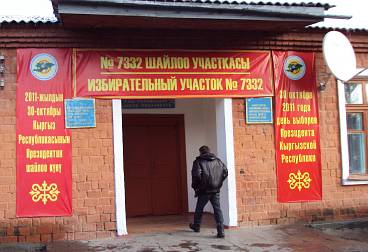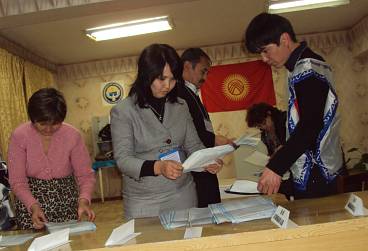Shaky steps towards democracy in Kyrgyzstan
Shaky steps towards democracy in Kyrgyzstan
On 30th October the people of the young democracy of Kyrgyzstan were able to elect their new President. As one of the three hundred observers from the Organisation for Security and Cooperation in Europe (OSCE), SP Senator Nanneke Quik-Schuijt had the job of determining whether these elections were conducted in an open and fair manner. No simple task, as can be seen from her report.

A polling station in Kyrgyzstan
In 1991Kyrgyzstan won its independence from the Soviet Union, although the country remained in many respects dependent on its massive neighbour. The first two presidents were forced out of office by popular uprisings, the latter in April 2010, following bloody riots in which dozens of people lost their lives. To this day no-one knows who was responsible for starting these riots. What is clear is that poverty and unemployment and a feeling amongst the Uzbeki minority that they are victims of discrimination had sowed the seeds of the unrest and violence.
An interim government took office under the leadership of Roza Otunbayeva, who established a new constitution and a new electoral law, on the basis of which presidential elections were held. The OSCE, which is concerned with the furtherance of cooperation in military, economic and humanitarian matters between its fifty-six member states in Europe, North America and Central Asia, was asked to monitor these elections.
The Central Asian country is bordered to the north by Kazakhstan, to the east by China and to the west by Tajikistan and Uzbekistan. Four-and-a-half times the size of the Netherlands, it has around a third of our population. It is one of the poorest countries of the former Soviet Union.
After an exhausting briefing day, where we learned something about the country and its people, and about the organisation of the elections and our tasks in relation to them, we were divided between different areas. I stayed in the north, where it’s peaceful. Problems were expected only in the south, where eighteen months ago the riots began and where they had been most violent.
Kyrgyzstan is a beautiful country with high mountains, lakes and extensive countryside. A single road with simple houses along it and unpaved side roads. Meeting my fellow observer, who was Spanish, our interpreter and driver, getting to know the terrain together, where the polling booths were, whether everything was in order. A chat with the women who were busy making preparations - could we have our photos taken together, and did we want something to eat? Shredded carrots, elderberry jam, and tea, always tea. Laughter, and thanks that we had come!
There was optimism over the democratic calibre of these elections. If in the past it was often the case that an election’s aim was to reinforce the power of the incumbent president, and that the result was invariably known in advance, now no-one knew who would be the winner. There were twenty-three candidates of whom two appeared in recent days to have emerged as possible victors.

In the polling station
From the point of view of our organisation, a shadow hung over these elections, however. On the day of the briefing, some of the observers’ accreditations were still not in order. The Dutch head of the mission, Corien Jonker, a former MP for the Christian Democrats, was told that the problem was that some of the photocopies of passports were not easily legible and that some of the necessary forms had not been filled in properly, and that this was true in the case of people from many different countries. The new electoral council needed to show its teeth. Intervention by ambassadors and foreign ministries was to no avail. Nevertheless, in the end everyone received a card to be hung around his or her neck as proof that the government had given its permission for them to be present in the polling station, up to and including the counting of the votes. This meant that the cards had to be delivered in great haste to the fourteen observer posts, distributed throughout this large country.
The voting went, as might be expected, much as it does back home. It was orderly and rather dull. What did cause some problems was that the electoral register is still not up to the standard of our own, so for example everyone over ninety was excluded. Anyone over that age who was still alive had to make a special request to be registered. The numbers allowed to vote from home were relatively large. This isn’t conducive to transparency. On the other hand, how transparent is our own franchise system? And out here if you see the roads, or the lack of them, and you realise that old people have no means of transport and are dependent on their neighbours’ donkey cart, then it’s nevertheless also indeed impressive that so many people, officials and members of political parties, with local observers, were prepared to seek out these elders. And it was in particular these older people who wanted to vote. Young people seem, just as back home, not all that interested. And don’t think that these elderly people are so keen to go to the polling booth because they are happy with the freedom that the democratic system has given them. Many were nostalgic for the free education and free health care of the Russian era. We might perhaps find it a minus point that the president, voted in by an overwhelming majority, has strong ties to Russia, but in the country itself things are seen differently.
In many cases the counting of the votes did not go well. Sometimes the observers were unable to watch, while in other regional polling stations the count was so organised that it was impossible for the observers to follow. As well, in many places the count was not begun until 7 a.m. the next morning and was sometimes still going on after twenty four hours, by which time the observers had left. Fatigue can take its toll.
The OSCE report will be critical, and with justice. There is evidence of fraud and the organisation is still not wholly in good order. Nevertheless we had, as observers, the impression that the faults were in most cases the result of clumsiness and inexperience rather than deliberate deception. Above all I felt it was important that people gave the impression of being completely relaxed, that the people of Kyrgyzstan cast their votes freely.
Now it remains only to wait and see what the new President, Almazbek Atambaïev, will do with the confidence that the people have invested in him.
